ITAA 1997 & Foreign Residents: Income Tax Treatment in Australia
VerifiedAdded on 2023/06/04
|6
|1240
|494
Report
AI Summary
This report provides a detailed analysis of income tax treatment for foreign residents in Australia, contrasting it with that of ordinary residents under the ITAA 1997. It highlights the four rules determining taxability based on citizenship: the Ordinary Concept Rule, the 183 days rule, the Domicile Rule, and the Commonwealth Superannuation Fund rule. Unlike Australian residents who are taxed on worldwide income, foreign residents are taxed only on income generated within Australia, including employment income, rental income, pensions, annuities, and capital gains from Australian property sales. The report outlines key differences in tax treatment, such as the lack of a low tax threshold and Medicare eligibility for foreign residents, and discusses the applicable tax rates and limited scope for exemptions following recent policy changes. It concludes that Australian tax laws are generally stricter for foreign residents, emphasizing the importance of understanding residency status and the implications for tax obligations related to Australian-sourced income and investments.
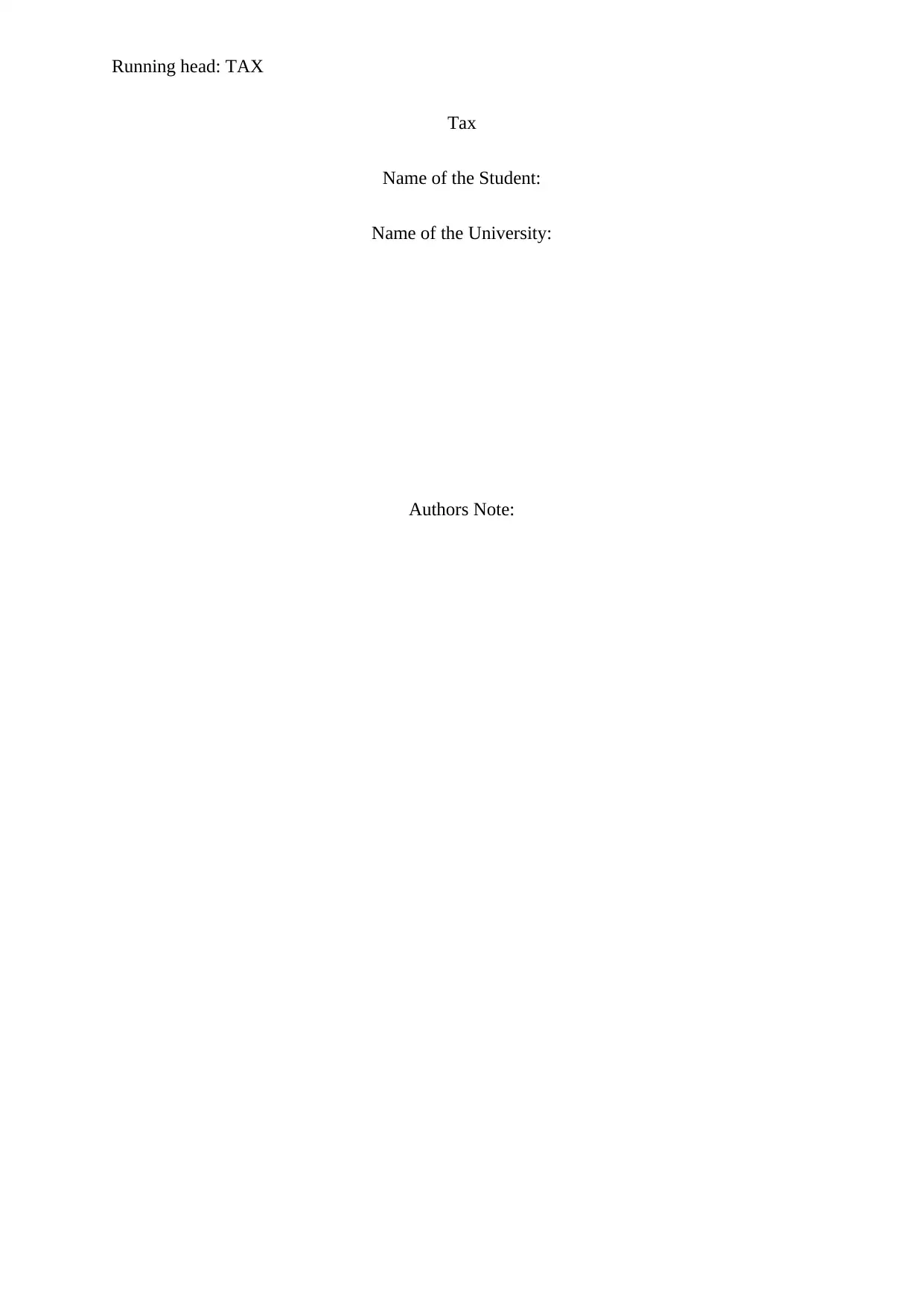
Running head: TAX
Tax
Name of the Student:
Name of the University:
Authors Note:
Tax
Name of the Student:
Name of the University:
Authors Note:
Paraphrase This Document
Need a fresh take? Get an instant paraphrase of this document with our AI Paraphraser
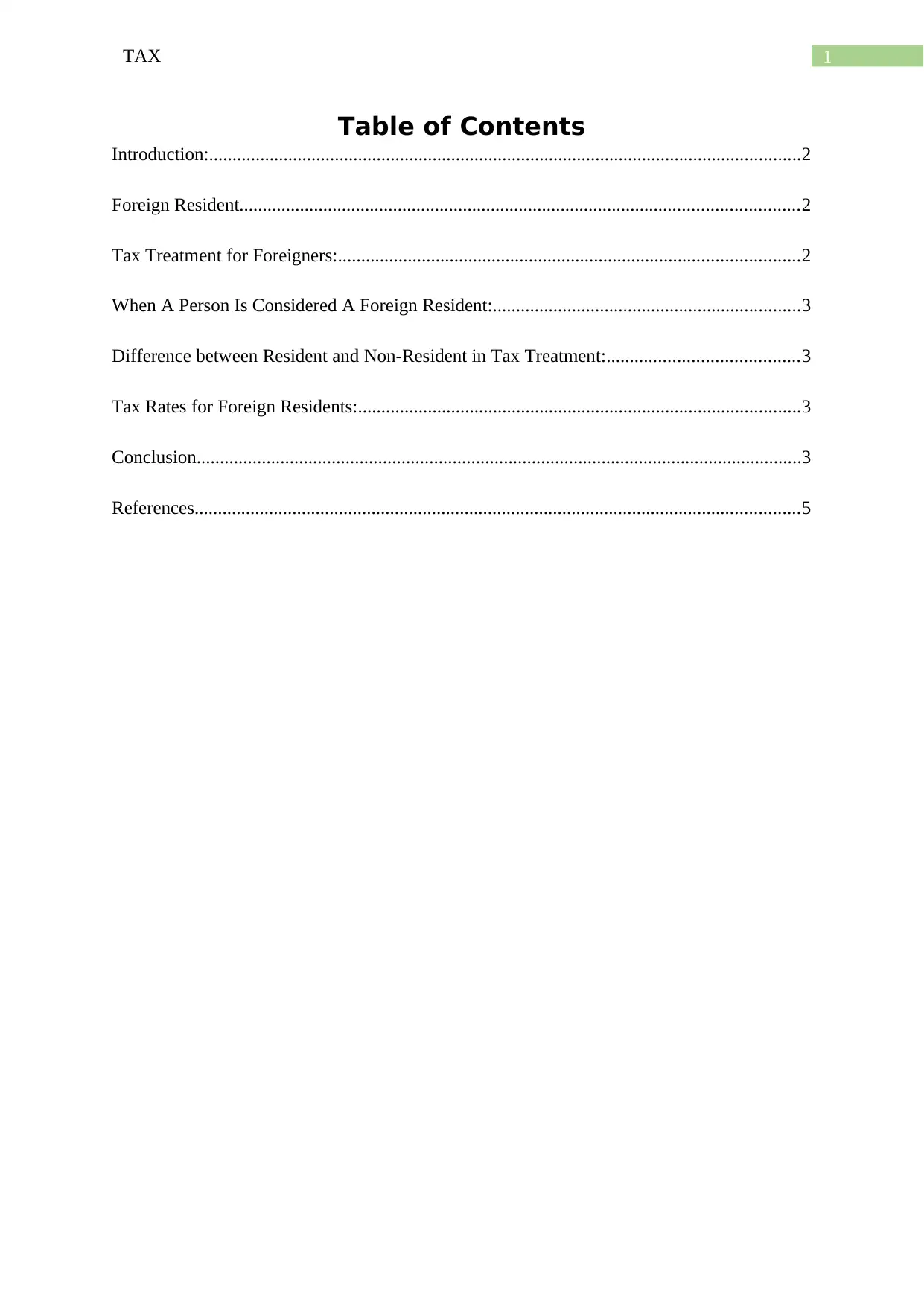
1TAX
Table of Contents
Introduction:...............................................................................................................................2
Foreign Resident........................................................................................................................2
Tax Treatment for Foreigners:...................................................................................................2
When A Person Is Considered A Foreign Resident:..................................................................3
Difference between Resident and Non-Resident in Tax Treatment:.........................................3
Tax Rates for Foreign Residents:...............................................................................................3
Conclusion..................................................................................................................................3
References..................................................................................................................................5
Table of Contents
Introduction:...............................................................................................................................2
Foreign Resident........................................................................................................................2
Tax Treatment for Foreigners:...................................................................................................2
When A Person Is Considered A Foreign Resident:..................................................................3
Difference between Resident and Non-Resident in Tax Treatment:.........................................3
Tax Rates for Foreign Residents:...............................................................................................3
Conclusion..................................................................................................................................3
References..................................................................................................................................5
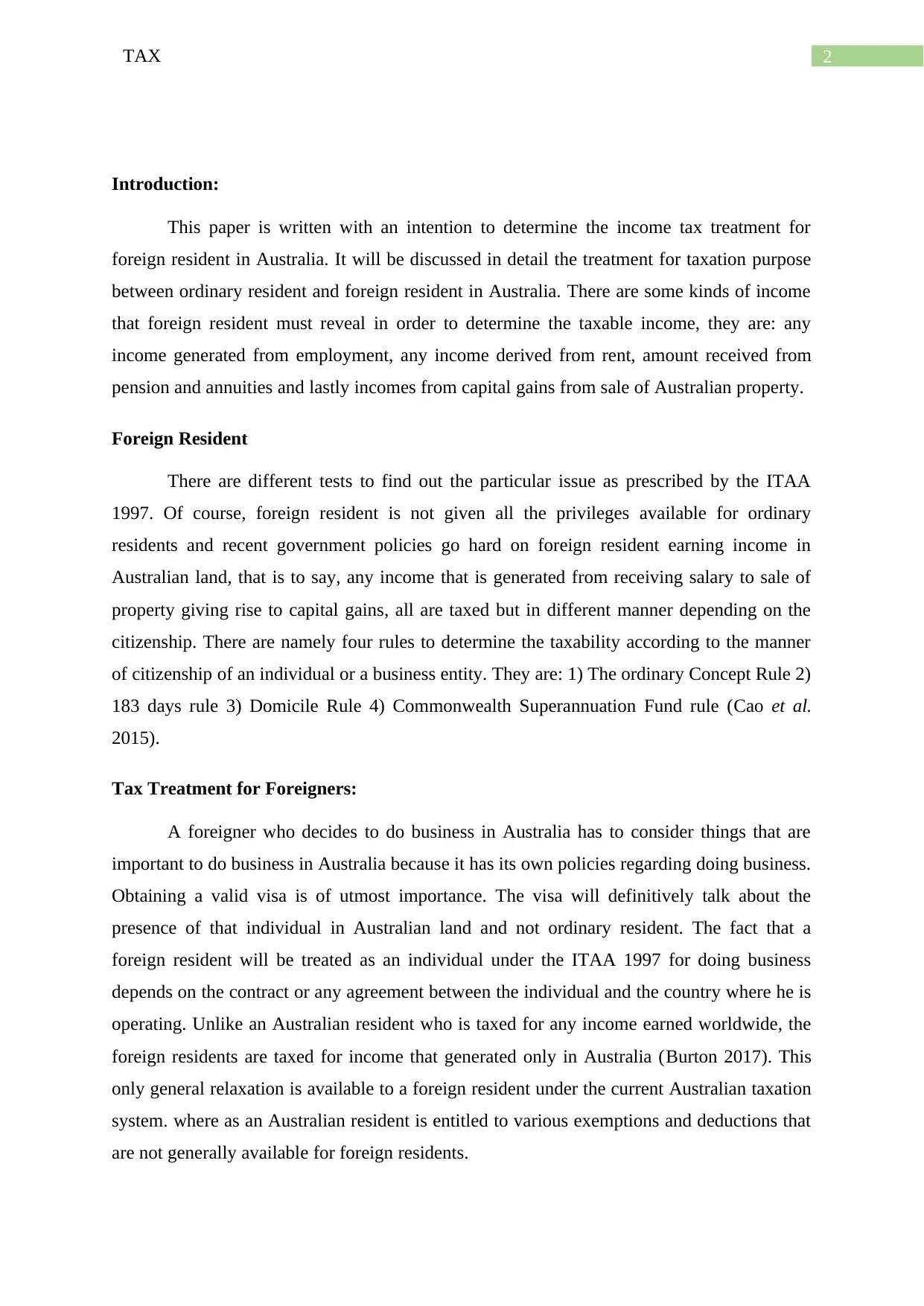
2TAX
Introduction:
This paper is written with an intention to determine the income tax treatment for
foreign resident in Australia. It will be discussed in detail the treatment for taxation purpose
between ordinary resident and foreign resident in Australia. There are some kinds of income
that foreign resident must reveal in order to determine the taxable income, they are: any
income generated from employment, any income derived from rent, amount received from
pension and annuities and lastly incomes from capital gains from sale of Australian property.
Foreign Resident
There are different tests to find out the particular issue as prescribed by the ITAA
1997. Of course, foreign resident is not given all the privileges available for ordinary
residents and recent government policies go hard on foreign resident earning income in
Australian land, that is to say, any income that is generated from receiving salary to sale of
property giving rise to capital gains, all are taxed but in different manner depending on the
citizenship. There are namely four rules to determine the taxability according to the manner
of citizenship of an individual or a business entity. They are: 1) The ordinary Concept Rule 2)
183 days rule 3) Domicile Rule 4) Commonwealth Superannuation Fund rule (Cao et al.
2015).
Tax Treatment for Foreigners:
A foreigner who decides to do business in Australia has to consider things that are
important to do business in Australia because it has its own policies regarding doing business.
Obtaining a valid visa is of utmost importance. The visa will definitively talk about the
presence of that individual in Australian land and not ordinary resident. The fact that a
foreign resident will be treated as an individual under the ITAA 1997 for doing business
depends on the contract or any agreement between the individual and the country where he is
operating. Unlike an Australian resident who is taxed for any income earned worldwide, the
foreign residents are taxed for income that generated only in Australia (Burton 2017). This
only general relaxation is available to a foreign resident under the current Australian taxation
system. where as an Australian resident is entitled to various exemptions and deductions that
are not generally available for foreign residents.
Introduction:
This paper is written with an intention to determine the income tax treatment for
foreign resident in Australia. It will be discussed in detail the treatment for taxation purpose
between ordinary resident and foreign resident in Australia. There are some kinds of income
that foreign resident must reveal in order to determine the taxable income, they are: any
income generated from employment, any income derived from rent, amount received from
pension and annuities and lastly incomes from capital gains from sale of Australian property.
Foreign Resident
There are different tests to find out the particular issue as prescribed by the ITAA
1997. Of course, foreign resident is not given all the privileges available for ordinary
residents and recent government policies go hard on foreign resident earning income in
Australian land, that is to say, any income that is generated from receiving salary to sale of
property giving rise to capital gains, all are taxed but in different manner depending on the
citizenship. There are namely four rules to determine the taxability according to the manner
of citizenship of an individual or a business entity. They are: 1) The ordinary Concept Rule 2)
183 days rule 3) Domicile Rule 4) Commonwealth Superannuation Fund rule (Cao et al.
2015).
Tax Treatment for Foreigners:
A foreigner who decides to do business in Australia has to consider things that are
important to do business in Australia because it has its own policies regarding doing business.
Obtaining a valid visa is of utmost importance. The visa will definitively talk about the
presence of that individual in Australian land and not ordinary resident. The fact that a
foreign resident will be treated as an individual under the ITAA 1997 for doing business
depends on the contract or any agreement between the individual and the country where he is
operating. Unlike an Australian resident who is taxed for any income earned worldwide, the
foreign residents are taxed for income that generated only in Australia (Burton 2017). This
only general relaxation is available to a foreign resident under the current Australian taxation
system. where as an Australian resident is entitled to various exemptions and deductions that
are not generally available for foreign residents.
⊘ This is a preview!⊘
Do you want full access?
Subscribe today to unlock all pages.

Trusted by 1+ million students worldwide
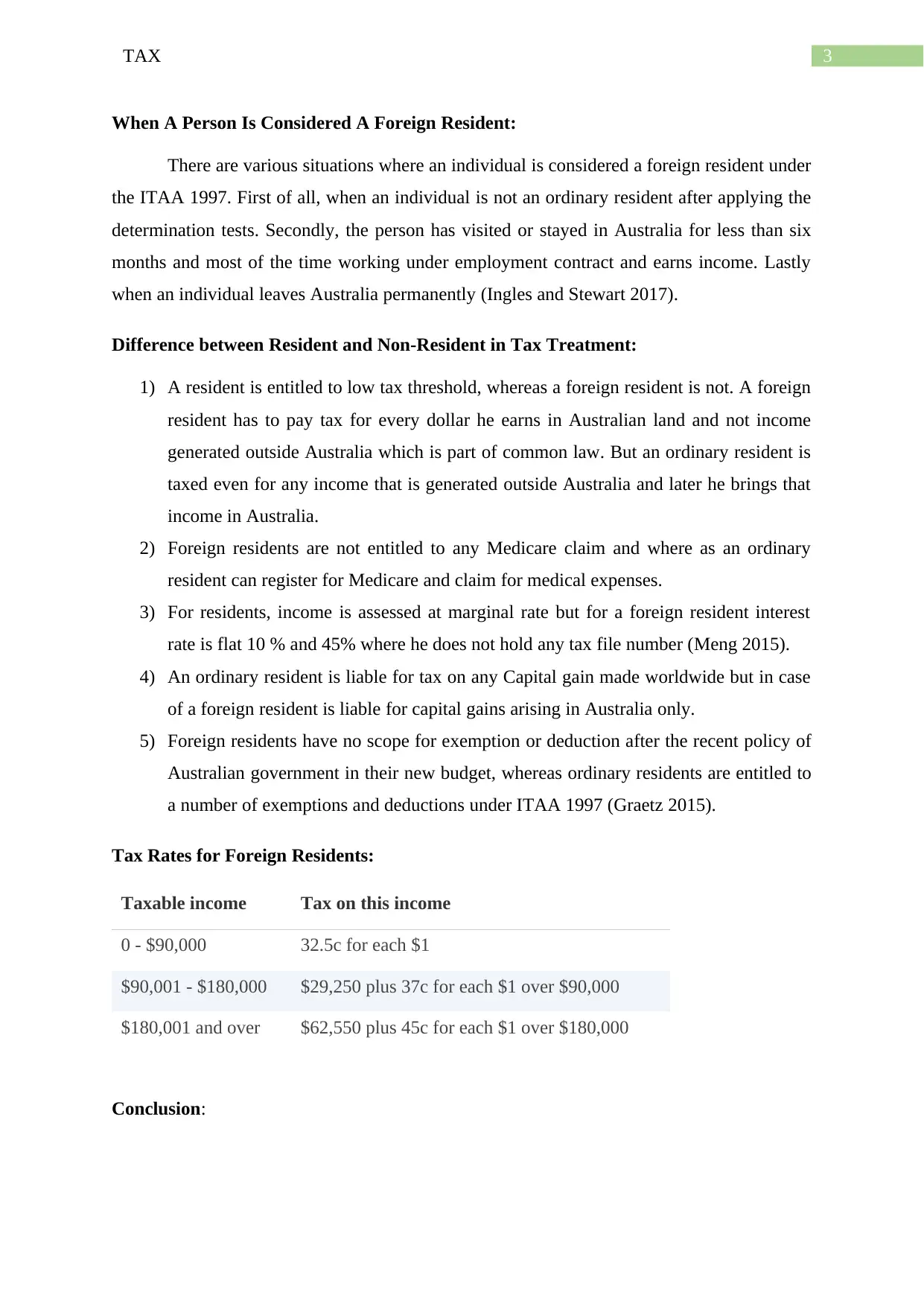
3TAX
When A Person Is Considered A Foreign Resident:
There are various situations where an individual is considered a foreign resident under
the ITAA 1997. First of all, when an individual is not an ordinary resident after applying the
determination tests. Secondly, the person has visited or stayed in Australia for less than six
months and most of the time working under employment contract and earns income. Lastly
when an individual leaves Australia permanently (Ingles and Stewart 2017).
Difference between Resident and Non-Resident in Tax Treatment:
1) A resident is entitled to low tax threshold, whereas a foreign resident is not. A foreign
resident has to pay tax for every dollar he earns in Australian land and not income
generated outside Australia which is part of common law. But an ordinary resident is
taxed even for any income that is generated outside Australia and later he brings that
income in Australia.
2) Foreign residents are not entitled to any Medicare claim and where as an ordinary
resident can register for Medicare and claim for medical expenses.
3) For residents, income is assessed at marginal rate but for a foreign resident interest
rate is flat 10 % and 45% where he does not hold any tax file number (Meng 2015).
4) An ordinary resident is liable for tax on any Capital gain made worldwide but in case
of a foreign resident is liable for capital gains arising in Australia only.
5) Foreign residents have no scope for exemption or deduction after the recent policy of
Australian government in their new budget, whereas ordinary residents are entitled to
a number of exemptions and deductions under ITAA 1997 (Graetz 2015).
Tax Rates for Foreign Residents:
Taxable income Tax on this income
0 - $90,000 32.5c for each $1
$90,001 - $180,000 $29,250 plus 37c for each $1 over $90,000
$180,001 and over $62,550 plus 45c for each $1 over $180,000
Conclusion:
When A Person Is Considered A Foreign Resident:
There are various situations where an individual is considered a foreign resident under
the ITAA 1997. First of all, when an individual is not an ordinary resident after applying the
determination tests. Secondly, the person has visited or stayed in Australia for less than six
months and most of the time working under employment contract and earns income. Lastly
when an individual leaves Australia permanently (Ingles and Stewart 2017).
Difference between Resident and Non-Resident in Tax Treatment:
1) A resident is entitled to low tax threshold, whereas a foreign resident is not. A foreign
resident has to pay tax for every dollar he earns in Australian land and not income
generated outside Australia which is part of common law. But an ordinary resident is
taxed even for any income that is generated outside Australia and later he brings that
income in Australia.
2) Foreign residents are not entitled to any Medicare claim and where as an ordinary
resident can register for Medicare and claim for medical expenses.
3) For residents, income is assessed at marginal rate but for a foreign resident interest
rate is flat 10 % and 45% where he does not hold any tax file number (Meng 2015).
4) An ordinary resident is liable for tax on any Capital gain made worldwide but in case
of a foreign resident is liable for capital gains arising in Australia only.
5) Foreign residents have no scope for exemption or deduction after the recent policy of
Australian government in their new budget, whereas ordinary residents are entitled to
a number of exemptions and deductions under ITAA 1997 (Graetz 2015).
Tax Rates for Foreign Residents:
Taxable income Tax on this income
0 - $90,000 32.5c for each $1
$90,001 - $180,000 $29,250 plus 37c for each $1 over $90,000
$180,001 and over $62,550 plus 45c for each $1 over $180,000
Conclusion:
Paraphrase This Document
Need a fresh take? Get an instant paraphrase of this document with our AI Paraphraser
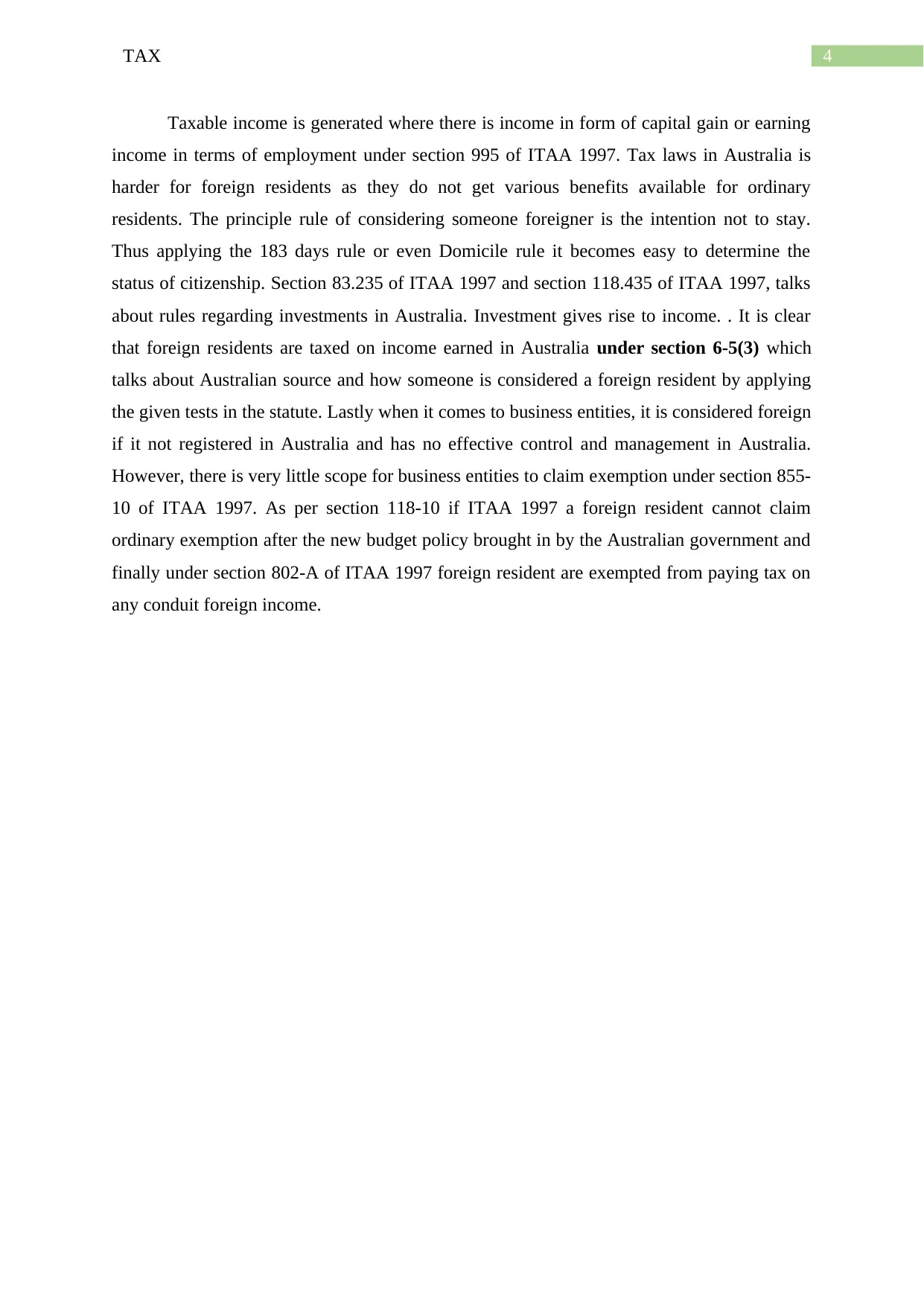
4TAX
Taxable income is generated where there is income in form of capital gain or earning
income in terms of employment under section 995 of ITAA 1997. Tax laws in Australia is
harder for foreign residents as they do not get various benefits available for ordinary
residents. The principle rule of considering someone foreigner is the intention not to stay.
Thus applying the 183 days rule or even Domicile rule it becomes easy to determine the
status of citizenship. Section 83.235 of ITAA 1997 and section 118.435 of ITAA 1997, talks
about rules regarding investments in Australia. Investment gives rise to income. . It is clear
that foreign residents are taxed on income earned in Australia under section 6-5(3) which
talks about Australian source and how someone is considered a foreign resident by applying
the given tests in the statute. Lastly when it comes to business entities, it is considered foreign
if it not registered in Australia and has no effective control and management in Australia.
However, there is very little scope for business entities to claim exemption under section 855-
10 of ITAA 1997. As per section 118-10 if ITAA 1997 a foreign resident cannot claim
ordinary exemption after the new budget policy brought in by the Australian government and
finally under section 802-A of ITAA 1997 foreign resident are exempted from paying tax on
any conduit foreign income.
Taxable income is generated where there is income in form of capital gain or earning
income in terms of employment under section 995 of ITAA 1997. Tax laws in Australia is
harder for foreign residents as they do not get various benefits available for ordinary
residents. The principle rule of considering someone foreigner is the intention not to stay.
Thus applying the 183 days rule or even Domicile rule it becomes easy to determine the
status of citizenship. Section 83.235 of ITAA 1997 and section 118.435 of ITAA 1997, talks
about rules regarding investments in Australia. Investment gives rise to income. . It is clear
that foreign residents are taxed on income earned in Australia under section 6-5(3) which
talks about Australian source and how someone is considered a foreign resident by applying
the given tests in the statute. Lastly when it comes to business entities, it is considered foreign
if it not registered in Australia and has no effective control and management in Australia.
However, there is very little scope for business entities to claim exemption under section 855-
10 of ITAA 1997. As per section 118-10 if ITAA 1997 a foreign resident cannot claim
ordinary exemption after the new budget policy brought in by the Australian government and
finally under section 802-A of ITAA 1997 foreign resident are exempted from paying tax on
any conduit foreign income.
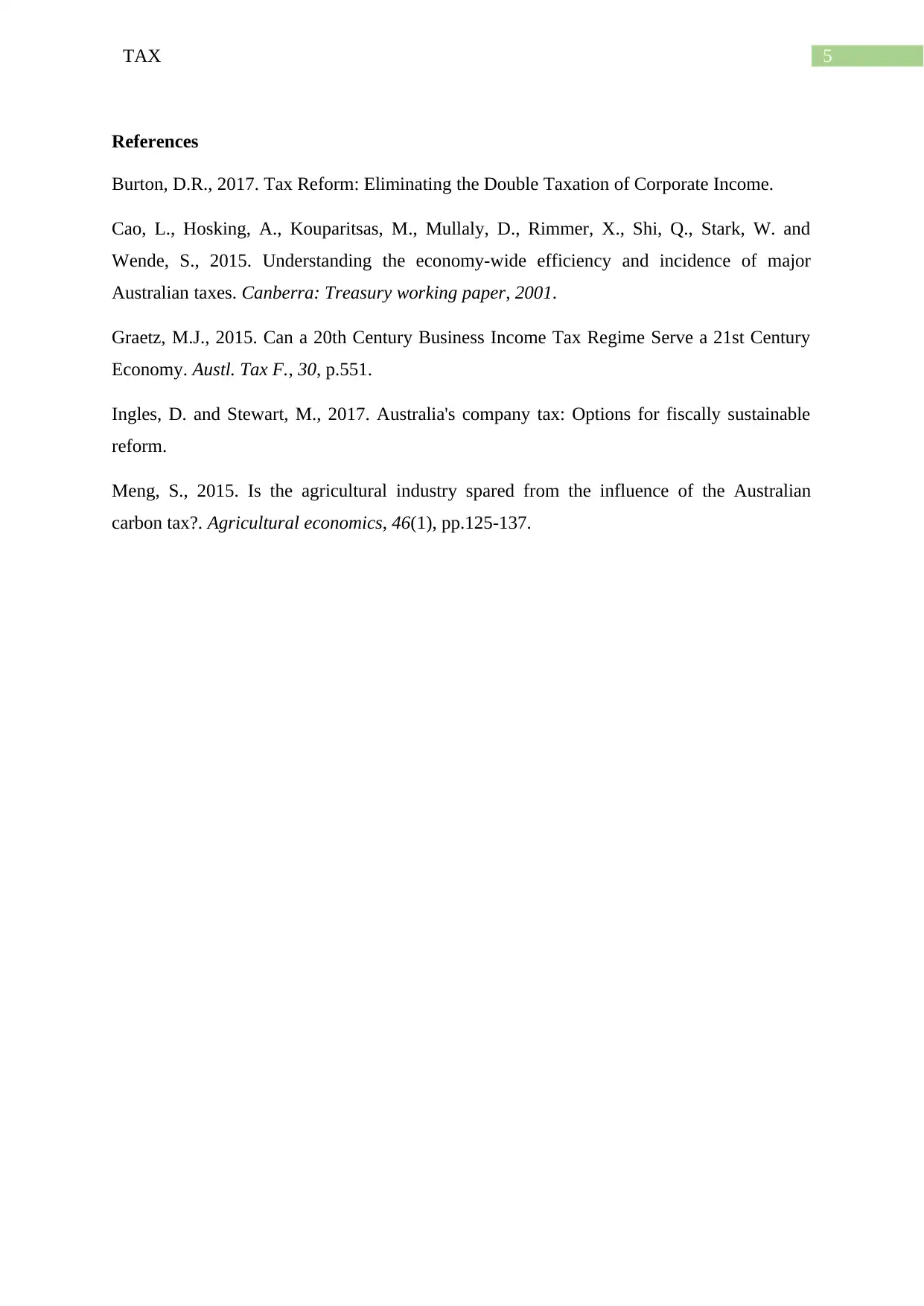
5TAX
References
Burton, D.R., 2017. Tax Reform: Eliminating the Double Taxation of Corporate Income.
Cao, L., Hosking, A., Kouparitsas, M., Mullaly, D., Rimmer, X., Shi, Q., Stark, W. and
Wende, S., 2015. Understanding the economy-wide efficiency and incidence of major
Australian taxes. Canberra: Treasury working paper, 2001.
Graetz, M.J., 2015. Can a 20th Century Business Income Tax Regime Serve a 21st Century
Economy. Austl. Tax F., 30, p.551.
Ingles, D. and Stewart, M., 2017. Australia's company tax: Options for fiscally sustainable
reform.
Meng, S., 2015. Is the agricultural industry spared from the influence of the Australian
carbon tax?. Agricultural economics, 46(1), pp.125-137.
References
Burton, D.R., 2017. Tax Reform: Eliminating the Double Taxation of Corporate Income.
Cao, L., Hosking, A., Kouparitsas, M., Mullaly, D., Rimmer, X., Shi, Q., Stark, W. and
Wende, S., 2015. Understanding the economy-wide efficiency and incidence of major
Australian taxes. Canberra: Treasury working paper, 2001.
Graetz, M.J., 2015. Can a 20th Century Business Income Tax Regime Serve a 21st Century
Economy. Austl. Tax F., 30, p.551.
Ingles, D. and Stewart, M., 2017. Australia's company tax: Options for fiscally sustainable
reform.
Meng, S., 2015. Is the agricultural industry spared from the influence of the Australian
carbon tax?. Agricultural economics, 46(1), pp.125-137.
⊘ This is a preview!⊘
Do you want full access?
Subscribe today to unlock all pages.

Trusted by 1+ million students worldwide
1 out of 6
Related Documents
Your All-in-One AI-Powered Toolkit for Academic Success.
+13062052269
info@desklib.com
Available 24*7 on WhatsApp / Email
![[object Object]](/_next/static/media/star-bottom.7253800d.svg)
Unlock your academic potential
Copyright © 2020–2026 A2Z Services. All Rights Reserved. Developed and managed by ZUCOL.





